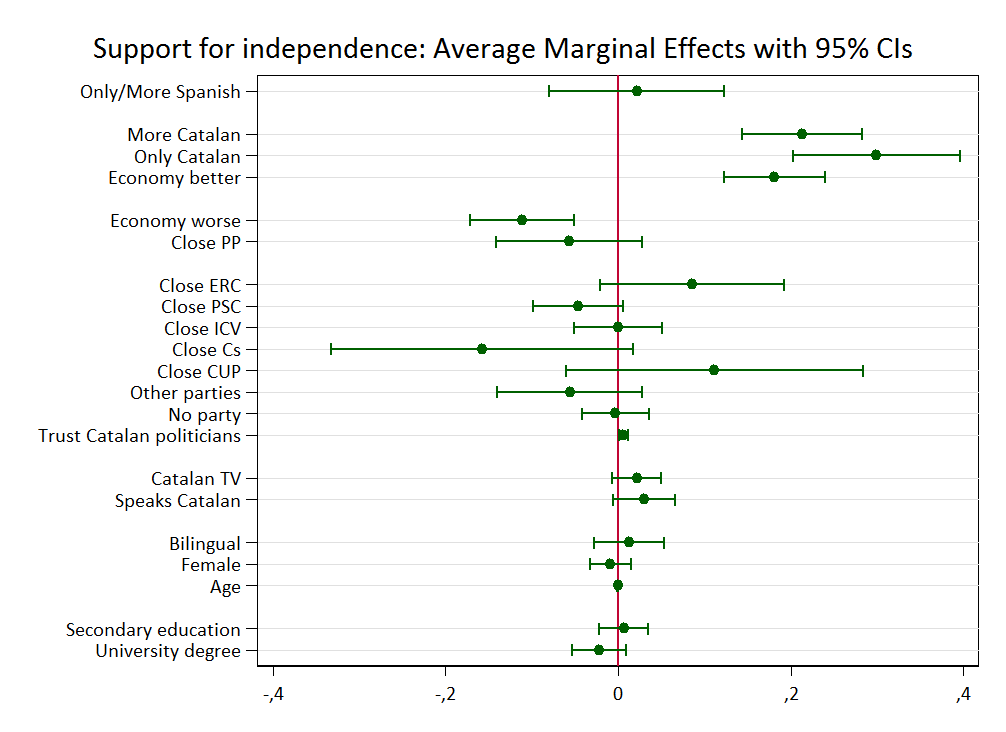Economic considerations play only a limited role in explaining support for Catalonian independence, but could be crucial in deciding the final outcome
The Scottish independence referendum saw economic considerations prove decisive, with the Yes campaign never fully convincing the electorate that voting for independence would bring with it greater prosperity. In Catalonia, a similar debate is under way, but this time economic considerations are set to play a smaller role – though they could yet be decisive in deciding whether independence eventually happens, according to Jordi Muñoz and Raül Tormos.

Credit: Jesus Solana, CC BY 2.0
Support for independence from Spain has grown quite sharply in recent years in Catalonia. The history of self-determination demands is long, but until very recently the mainstream of the Catalan nationalist movement aimed at greater autonomy, short of full secession. Public opinion data reflected this state of affairs: in 2006 only around 13% of the citizens surveyed by the official Catalan polling institute expressed that full independence was their preferred constitutional arrangement. The majority was either satisfied with the status quo or asked for a federalization of Spain. However, in a few years the picture had been deeply transformed and today, according to the available surveys, independence would gain the majority in a referendum.
Given that such an increase in support for independence was not preceded by a substantial transformation of Catalans’ national identities, we face the question of what else could have lead such a relevant change in the Catalan public opinion. An alternative story is related to the influence of political elites on the public opinion. Nationalist parties would have decided to intensify their demands and would have been able to convince their bases to support full independence. However, the complex and reciprical relationship between elite and public opinion preferences makes it difficult to determine a clear pattern of influence.
But the main alternative explanation that has been put forward is the economic one. Many, both in Spain and the international media, have made the connection between the increased support for independence and the economy. This is not surprising, since the timing of the rise in support for independence and the rise in unemployment are highly correlated. According to many, a combination of a widespread sense of fiscal grievances and a deep economic crisis might have fueled the desire of separation among Catalan citizens aiming at improving their economic situation through independence.
In a recent article in the European Political Science Review sing survey data we find that, national identity is the factor that has a stronger effect on the probability of supporting independence. But we also find that economic expectations do seem to play a significant role. Expecting that the economy would get better increases the probability of supporting independence by 0.18 with respect to those that think it would not matter or that they do not know. On the other side, considering that things would get worse depresses the probability of supporting independence, by 0.11 points after controlling for identity and partisanship.
Figure 1: Support for independence
More interestingly, both effects are not independent from each other: the economy seems to matter mostly for citizens with ambivalent identity positions. Also, economic considerations are more salient for those with no party identification, or partisans of parties with less clear-cut stances on the issue. The economy seems also the matter more for those with less interest in politics. Overall, this points to the fact that the economy is important especially for those that are less likely to support either side of the debate.
However, as simple and appealing as the economic story can be, the empirical identification of the causal effect of economic expectations on support for secession is far from straightforward. As the literature on Quebec had already concluded in the 90s, finding an empirical association between positive expectations on the economic consequences of independence and support for secession is not informative of the causal relationship. It can well be that this association masks a process of rationalization, according to which those citizens that have pro-independence attitudes tend to look on the bright side when inquired about the economic implications of secession while those that oppose it tend to rationalize their opposition by underlining its negative consequences.
Disentangling this reciprocal relationship is not easy, but in order to shed some light on the causal impact of the economy on support for independence we devised a simple survey experiment in which we provided the respondents a small piece of information underlining the positive or negative arguments made regarding the economic consequences of secession. Results show a modest but significant increase in support for independence of 5.6% when we present an optimistic account of how would the economy fare if Catalonia was to become an independent country. The magnitude of the effect is, however, proportional to our ability to effectively ‘treat’ our respondents: only about 6% of them changed their own expectations regarding the economic situation after our treatment. Moreover, in the experimental study we also found that our treatment was important mostly for those with dual Catalan-Spanish identities, just like in the observational analysis.
All in all, our evidence reveals that, while the economic story does not seem to be central to explain independence support among the Catalan public opinion, it does play an independent and significant role. And it is especially important for those citizens that are, a priori, less likely to have a strong take on the issue: those with ambivalent identities, with no partisanship or partisans of ambivalent parties, and those with less interest in politics. Therefore, it seems that the economic calculus is playing at the margins and not at the centre of the story. But it might, nonetheless, be crucial in ultimately shaping a majority in favour or against independence.
—
Note: this post gives the views of the author, and not Democratic Audit UK, nor of the London School of Economics. Please read our comments policy before commenting.
—
 Jordi Muñoz is ‘Ramón y Cajal’ research fellow in Political Science at the University of Barcelona. His research interests are related to political behavior and experimental methods. He has published articles in journals such as Comparative Political Studies, European Political Science Review, Electoral Studies or European Union Politics.
Jordi Muñoz is ‘Ramón y Cajal’ research fellow in Political Science at the University of Barcelona. His research interests are related to political behavior and experimental methods. He has published articles in journals such as Comparative Political Studies, European Political Science Review, Electoral Studies or European Union Politics.
 Dr Raül Tormos is survey researcher at the official Catalan polling institute (Centre d’Estudis d’Opinió), and lecturer in sociology and quantitative methods at the University of Barcelona. He has published in journals such as European Political Science Review and Revista Española de Investigaciones Sociológicas. His current projects involve the study of national identity change as well as the dynamics of values from a longitudinal comparative perspective.
Dr Raül Tormos is survey researcher at the official Catalan polling institute (Centre d’Estudis d’Opinió), and lecturer in sociology and quantitative methods at the University of Barcelona. He has published in journals such as European Political Science Review and Revista Española de Investigaciones Sociológicas. His current projects involve the study of national identity change as well as the dynamics of values from a longitudinal comparative perspective.






 Democratic Audit's core funding is provided by the Joseph Rowntree Charitable Trust. Additional funding is provided by the London School of Economics.
Democratic Audit's core funding is provided by the Joseph Rowntree Charitable Trust. Additional funding is provided by the London School of Economics.
What role do economic considerations play in explaining support for Catalonian independence? https://t.co/svKtmWaAEb
Economic considerations play only a limited role in explaining support for Catalonian independence, but.. https://t.co/6Mudkon6Z4
Economics plays a role in explaining support for Catalonian independence, but could be crucial to the final outcome https://t.co/NSMqWrcfg6
Economic considerations a limited role in #Catalonian #independence v> @democraticaudit https://t.co/zp3z9hne3b https://t.co/oLWJ3ZDnHf
Economic considerations could be crucial in deciding the outcome of Catalonian independence https://t.co/hRtYgVkykZ https://t.co/lTpluBgQhf
Economic factors play only a limited role in explaining support for Catalonian independence, but could yet decide it https://t.co/dt5p4d0LgX
Economic considerations play only a limited role in explaining support for Catalonian independence, but could be… https://t.co/h7aV2GZWn2